The big test: CBS moves campus to cyberspace
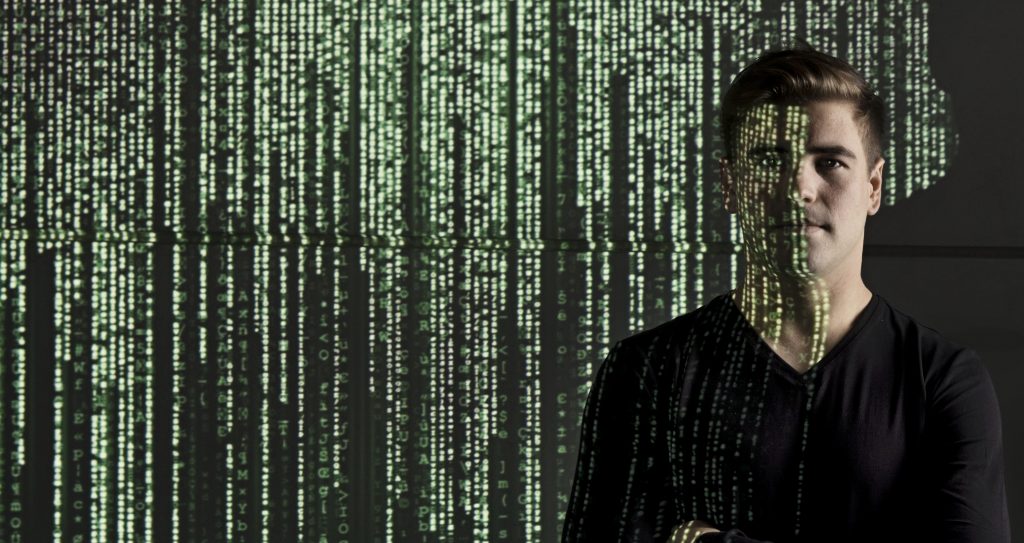
Since Thursday last week, teachers, IT support and the Teaching and Learning unit have worked to convert on-campus teaching to go online. (Photo: Lisbeth Holten)
Coronavirus prevents us being together, but luckily we can meet in cyberspace. Here, teachers, students and the Head of Teaching and Learning at CBS explain from their home offices how moving lectures, study groups and oral exams online is coming along. “It will definitely take more self-discipline,” says a student.
I’m standing outside CBS at Solbjerg Plads. The bike stands, which are normally packed with bikes, are empty. A young guy with a backpack walks across Solbjerg Plads towards one of CBS’ entrances, only to find it closed – like the rest of CBS.
CBS has shut down all its campuses, but since March 11, the staff – ranging from IT support, administrative staff and teachers to CBS’ Teaching and Learning unit – have been working on transferring CBS’ many on-campus teaching activities to an online setting.
CBS’ Teaching and Learning unit has various tasks, including advising and supporting teachers on how to develop their teaching and try the new methods, as well as showcasing the different tools in CBS’ new learning platform, Canvas, and demonstrating how they work. Since CBS’ campus closed down on Thursday March 12, Teaching and Learning has been pulling out all the stops.
“Friday morning, we had a tsunami of calls and emails from teachers requesting support. I made a rough count that day and altogether more than 300 teachers contacted our support team with all sorts of needs ranging from how to record videos to how they can supervise students. And that’s totally okay because this is a huge transformation,” says Jakob Ravn, Executive Director of Teaching and Learning.
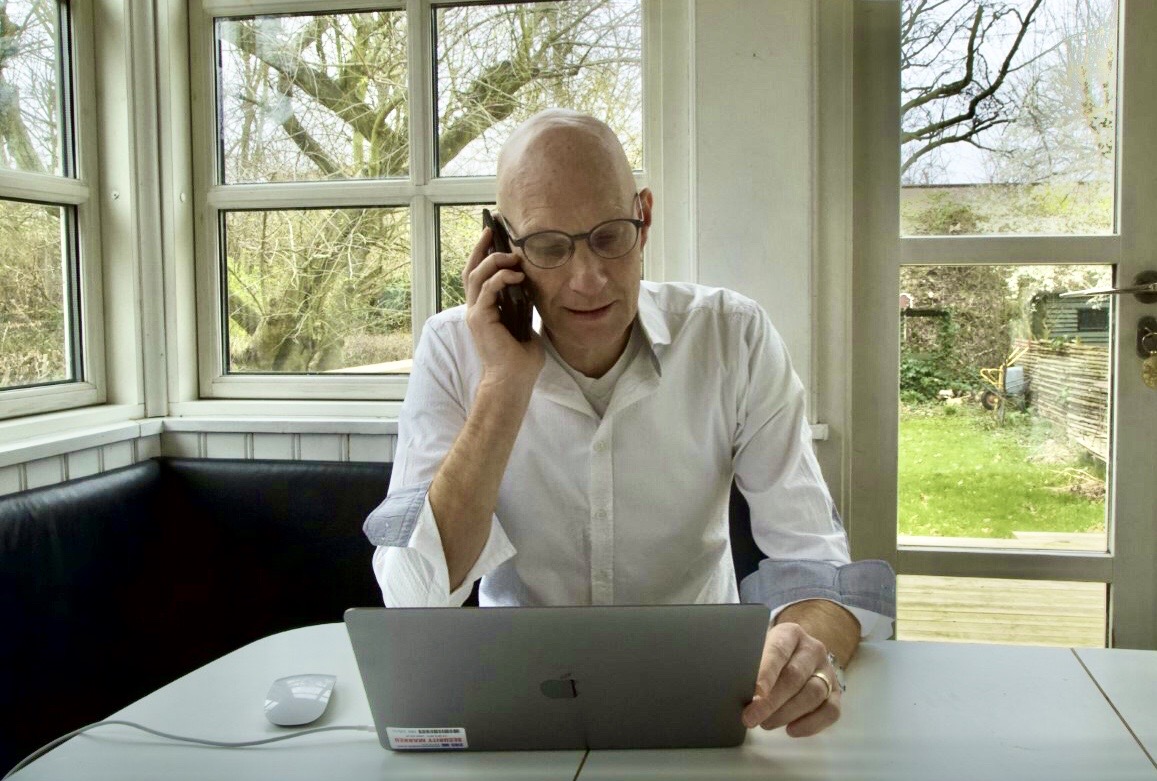
One of the teachers who has received Teaching and Learning support is Maribel Blasco, Associate Professor at the Department of Management, Society and Communication and teacher of Culture and Cultural Economy at HA EB and Cultural Analysis at the BSc in Business, Language and Culture.
For her, the process of rescheduling her teaching has been quite “overwhelming” and would have been impossible without support from Teaching and Learning.
“For someone like me who’s not that tech savvy, starting to record videos has added to the stress. I have spent two or three days just making things work. The microphone in my laptop didn’t work, so I had to get an external one, then I couldn’t access Teams, which is where we do online meetings, and then my mouse got stuck somehow,” she says on the phone as she lets out a laugh and adds:
“And despite all that, the students have been so understanding and have shown so much solidarity. The same goes for my colleagues and people from Teaching and Learning, who have been incredibly supportive, patient and professional. We are more distant due to remote working, but we have come closer because of the situation. Everything has a bright side.”
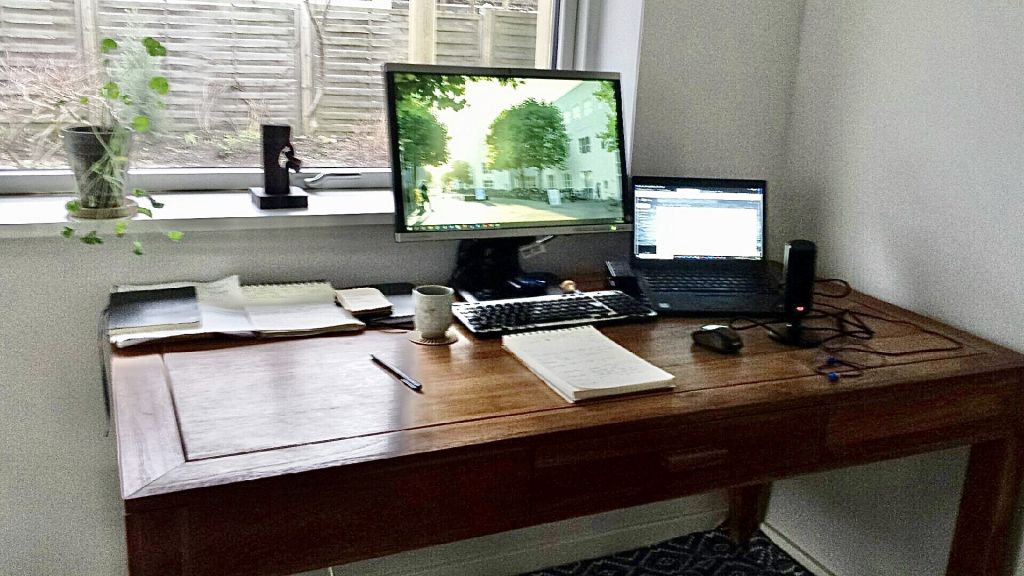
Maribel Blasco usually has her office at Dalgas Have, but is now able to do video recordings and online meetings from her home office. (Photo: Maribel Blasco)
Maribel Blasco explains that despite all the technicalities she faced at the outset, the online lecture she held with a guest lecturer recently was a success.
“Through the program Microsoft Teams, I could invite students to join the session with a guest lecturer, and by turning on their mics, they could ask questions online. It was quite inspiring, and there was a very high participation rate, which pleased me a great deal,” she says.
Teaching from the living room
On the morning of Thursday March 12, teachers and managers from the Graduate Certificate Program (HD1) decided to postpone all planned on-campus teaching for a week to make time for converting all teaching into online formats, explains Carsten Scheibye, Assistant Professor at the Department of Operations Management and Program Director of HD1, which has about 1,100 enrolled students.
“We are trying to create an online course flow that resembles the one we would have had on campus as closely as possible. It will take place at the usual time, and participants are together with their classmates and teachers, but online through Microsoft Teams to conduct live sessions synchronous, and these are supported with extended materials with the purpose of securing dialogue,” he says and continues:
“We know it will be different, and we will continuously add videos that explain the main themes and record everything, so that it can be streamed afterwards.”

The past week, Carsten Scheibye, Program Director of HD1, has had regular online meetings with teachers about how to structure the online teaching. (Photo: Private)
For example, Carsten Scheibye is recording videos from his living room at home, where he will explain various chapters from the books his students are currently studying. And all the teachers at HD1 have taken a crash course on how to show slides online, how to invite students to online meetings, and how to make video recordings etc.
“Our job right now is to make sure that the students are offered the learning that they have signed up for,” he says and continues:
“And it is only working because we are cooperating across departments, units and professions.”
Jakob Ravn from Teaching and Learning admits that students and staff might experience that the teaching is not up to on-campus quality, where dialogue, discussions, direct feedback and active, engaging teaching flow more freely.
Especially teachers who have based their teaching on dialogue are finding it hard to convert to the online format, he explains.
“Simple lectures are relatively easy to convert, but if you have made a course that is based on group discussions, with a lot of student involvement, it’s trickier. And those are the teachers who are finding this situation most frustrating,” he says and continues:
“When that is said, I believe there’s no doubt that much of what we are trying to do right now is succeeding, thanks exclusively to the flexibility of the teachers, students, and administrative staff.”
Self-discipline in disruptive times
In an apartment in Copenhagen, Nicolai Rehn, who studies Business Administration and Sociology at CBS, has just bought a pair of noise cancelling headphones. He is studying from home with his girlfriend, who also needs to hold meetings with her study group and classes online.
“It’s an interesting experience for sure, and it’s a disruptive period for all of us,” he says.
Nicolai Rehn has already had some online courses, and right now everyone – students and teachers alike – are having to find their feet in the online learning environment.
“Some teachers are posting audio files, some posting videos, and that works, but some methods are more effective than others, of course. And potential improvements are being considered,” he says.
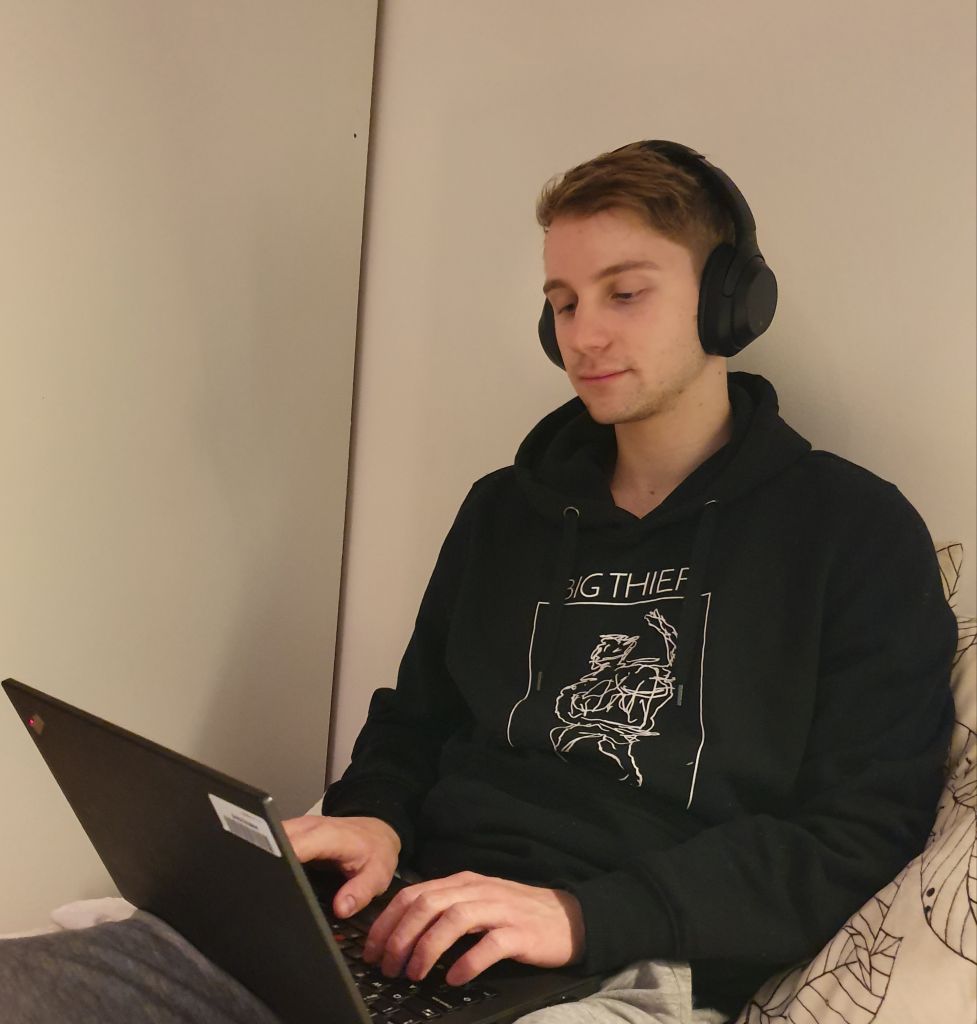
Nicolai Rehn shares an apartment with his girlfriend who’s also doing her studying from home. Therefore, he has bought a pair of noise-canceling headphones. (Photo: Private)
Natalie Mierswa, an exchange student at CBS, is from the UK. For her, transitioning to online courses is nothing new. Last fall, she was studying in Hong Kong when the protests forced universities to close down, and teaching was continued online.
“I’m grateful that I tried this in Hong Kong. My friends need a little more time to adjust to the new formats, but I feel a little more balanced about the whole situation,” she says.
Natalie Mierswa was considering leaving Denmark and returning to the UK. However, cases of coronavirus have been diagnosed in the building where she used to live, and the neighborhood she is from is ranked third among coronavirus hot spots, she explains.
Nevertheless, she is fortunate in terms of teaching. She had just completed one of the last sessions of her latest course before CBS shut down, and has no other courses until after the Easter break. But an exam is approaching, and many factors remain unclear.
“I missed an online meeting the other day because I had some tasks to complete for my home university. At the meeting, the teacher explained the new exam format, which will now be a 10-page assignment instead of an oral exam. But everyone I’ve talked to seems somewhat confused about what will happen,” she says.
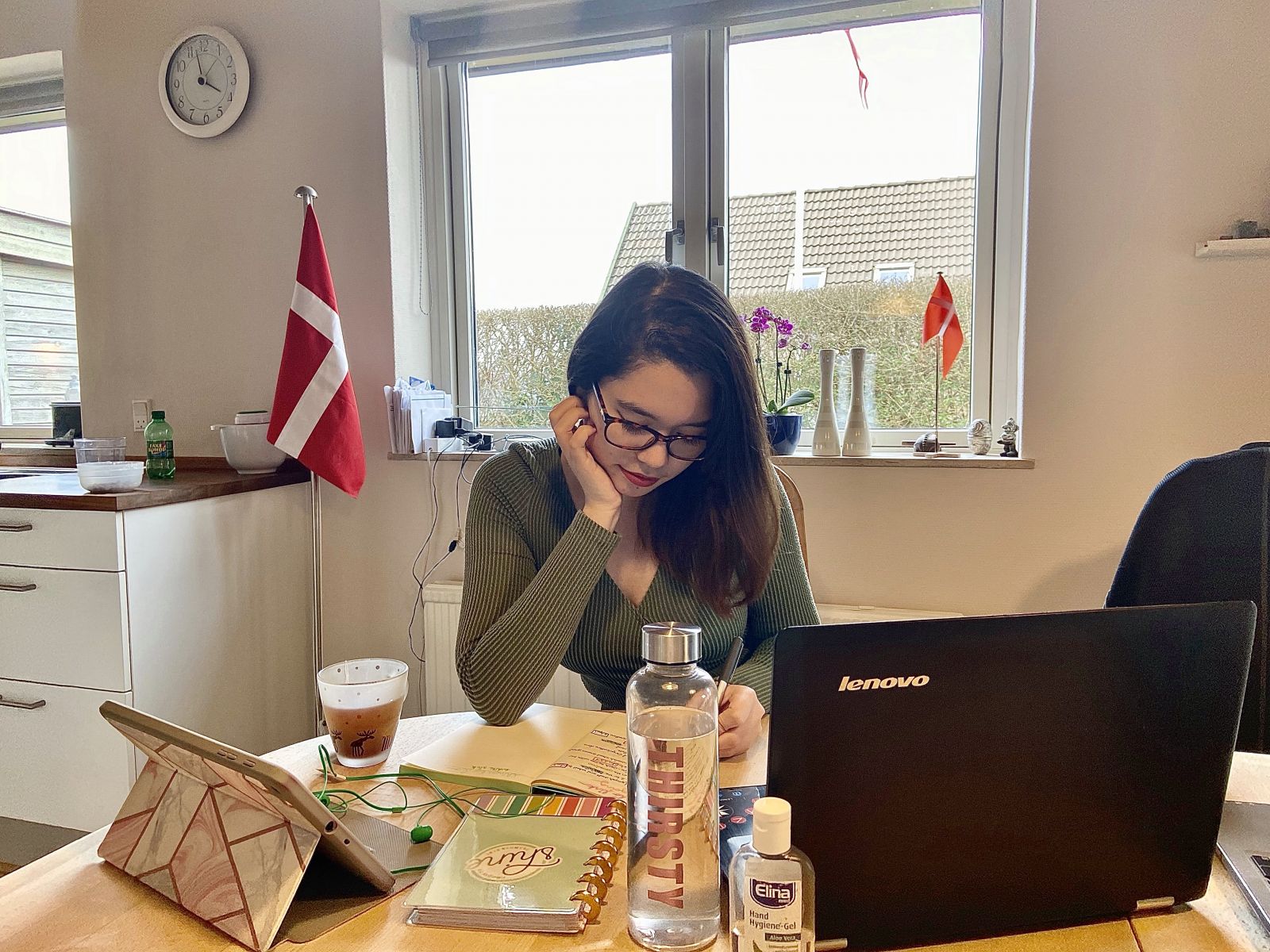
Not only will the students have to follow classes online and hold online meetings with their study groups, they will also have to restructure how they work. Many students at CBS use the libraries for studying, but what will they do now that the libraries are closed?
“Usually, home is a place to rest or chill out, and it’s difficult to adjust when you can’t go to the library and do things there in peace and quiet. More self-discipline will definitely be required when you can’t attend classes on campus,” says Nicolai Rehn.
Since Natalie Mierswa has participated in online courses before, she is used to being self-disciplined, and believes that many students will learn more self-discipline in the process.
“I have made my own timetable of things I want to do and what my day will look like. For example, I’m working on assignments but also fitting in some time to write job applications,” she says and continues:
“I think it’s good to learn this skill and experience how to work productively from home. Under normal circumstances, a lot of people work from home, and it prepares us for that.”
Oral exams in an online setting
Although teaching is a huge part of everyday life at CBS, exams are too. CBS is the kind of university that has exams continuously, so although most of them are planned around summer and winter, exams are scheduled throughout the year.
The exam formats range from oral exams to 72-hour written exams that can be completed from home, and seated exams in CBS’ exam halls. Various new solutions to how exams should function are currently being discussed, explains Jakob Ravn.
“For oral exams, students normally verify themselves with their student IDs, and this will still be the case if we hold oral exams online. They must then show that they are alone in the room, and we will need to figure out a lot of practicalities, for example if it counts as an attempt if the connection is too slow to complete the exam. These are the kinds of issues that we are working on right now, and we will communicate to the students as soon as the necessary decisions have been made,” he says.
Teachers are generally being asked to see if the exam format can still work in an online format and if not, whether it makes more sense to adapt to a different format.
On the bright side
We are in the early stages of the shutdown, and no one knows whether it will be prolonged or not. But everything will return to normal at some point. CBS’ halls and auditoriums will be filled with students and staff. Teaching will continue as normal, and students will have peace and quiet for studying at the libraries or enjoying a beer at the Thursday bar in Café Nexus.
Will we learn anything from the current situation? Can some good come from the coronavirus? Yes, is the short answer.
“I believe that students and teachers will have learned a lot about how specific tools and systems work. Technical barriers will have moved. I also believe many people will discover that they can make courses and activities online with great success,” says Jakob Ravn, who hopes that everyone has learned to appreciate having a campus where they can meet for teaching and other activities.
“We no longer have a place where we can socialize and engage in dialogue, and it’s really hard to reproduce that in an online space. So this is also teaching us what is not possible. We can’t do without the university. We need a campus full of life because it gives value to what is being taught, and we can’t replicate that online,” he says.
Carsten Scheibye agrees, and sees great learning perspectives in the current situation. Not only in terms of becoming familiar with new technology and software, but also for CBS as a whole.
“During these times, we must collaborate in entirely new ways to make this work. Administrative staff, managers, researchers from different fields are coming together to support the work that is being carried out now, and that’s fantastic,” he says.
For her part, Maribel Blasco has realized what is actually important in her day-to-day working life.
“The situation puts into perspective what we stress about, and whether it’s worth stressing about. Maybe we prioritize things that are not important? Here, I’m thinking about rankings, performance and measurements. That’s been put into perspective in this human crisis. I just hope that the solidarity I am seeing right now will continue, because it’s a whole new positive dimension that I have never seen before,” she says.



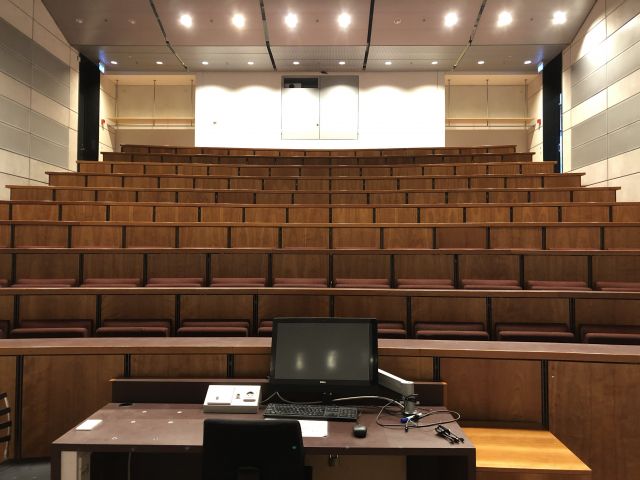

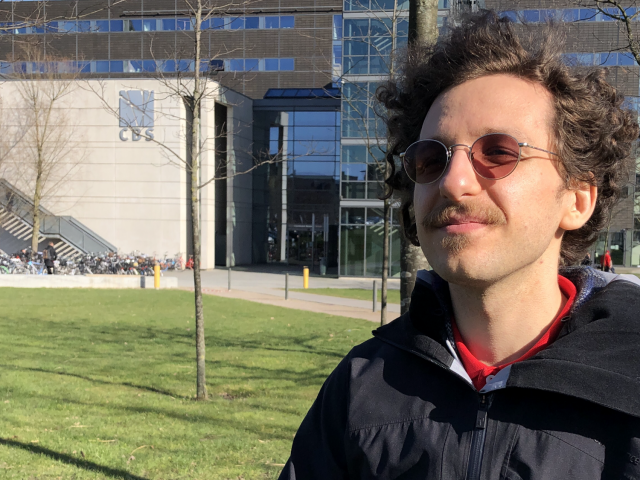
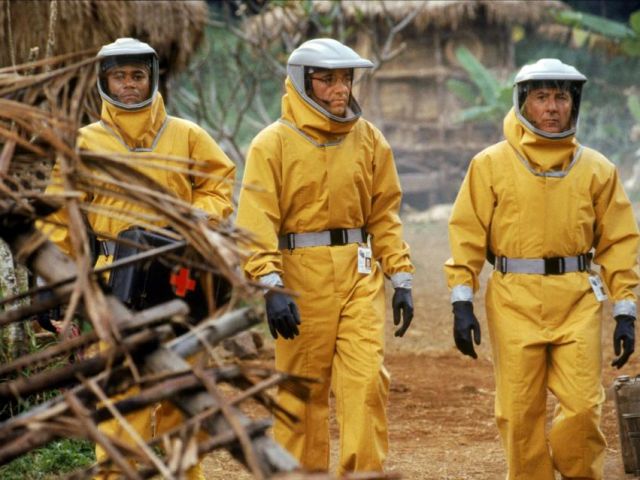






























































































































Comments